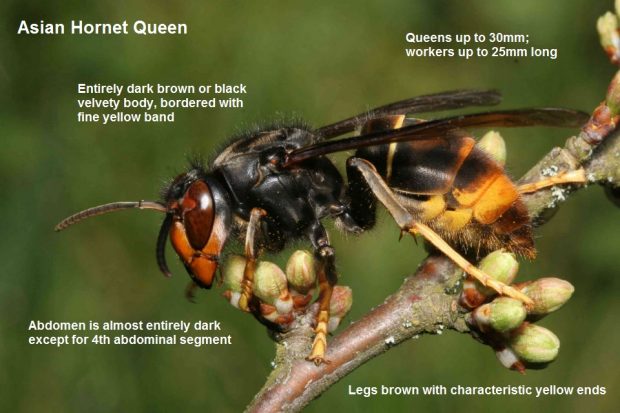
A number of UK news websites have picked up on US coverage on sightings of the Asian giant hornet (Vespa manadarinia) in America, and have since run incorrect coverage confusing this species with the quite separate Asian hornet (Vespa velutina).
This mistake has led to unfounded claims that the much more dangerous species found in America (the Asian giant hornet) has been seen in the UK. To confirm, this is not the case and there have been no confirmed sightings of Asian giant hornets in Europe.
The Asian hornet, however, is not new to the UK - with 17 confirmed sightings in England since 2016. This species is smaller than our native hornets and poses no greater risk to human health than a bee, and it is crucial we do not confuse these two species. If you think you have spotted an Asian hornet, report your sighting through the Asian hornet app or online.
We are well versed at dealing with the Asian hornet, which is not native to the UK. When a sighting is confirmed, experts from the National Bee Unit (NBU) and the Animal and Plant Health Agency (APHA) will work quickly to find and destroy any active nests in the area. Nine nests have been destroyed since 2016, and the latest case of Asian hornet was confirmed near Christchurch, Dorset on 1 October 2019.
While the Asian hornet is no more dangerous to humans than a bee, it is a threat to our native bee population which is why we have a robust programme in place to spot and eradicate them.
A Defra spokesperson said:
There have been no confirmed sightings of Asian giant hornets in Europe and this species must not be mistaken for the more common Asian hornet.
While the Asian hornet has been found in the UK, these pose no greater risk to human health than a bee.
You can report sightings through the Asian hornet app or online.
5 comments
Comment by Sarah Bunker posted on
Misspelling of mandarinia.
Thanks for putting this out. I have had American podcasts wanting me to talk about V. mandarinia and it is quite a battle getting them to understand that these are different species with quite different behaviour and that we don't have V. mandarinia in Europe!
Comment by Chris Coulson posted on
Yes we know but that wasn't the question.
Comment by Chris Coulson posted on
Apparently the bee keeper in Spain was not allergic to bee stings though I realise that this can change rapidly from non allergic to allergic. However, since the threat of the AH invading the UK it has been intimated that the sting is dangerous. Has something changed? Is it the difference between a single sting and a mass attack? My concern is what do we tell the public when asked.
Comment by Chris Coulson posted on
No more dangerous than a bee sting? A beekeeper in Spain has recently died of an AH sting.
Comment by John Howat posted on
And a lot of people die from bee stings, including beekeepers.